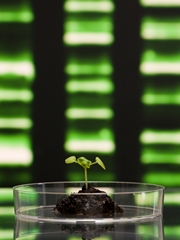 Plant adaptation to environmental stresses is dependent upon activating cascades of genes involved in stress response. Therefore, engineering genes involved in stress response can enhance tolerance. Unravelling stress-associated gene resources for key crops will enable future molecular dissection. Progress is now anticipated through comparative genomic studies of model organisms, and through the use of high-throughput techniques.
Plant adaptation to environmental stresses is dependent upon activating cascades of genes involved in stress response. Therefore, engineering genes involved in stress response can enhance tolerance. Unravelling stress-associated gene resources for key crops will enable future molecular dissection. Progress is now anticipated through comparative genomic studies of model organisms, and through the use of high-throughput techniques.
In Phase I, GCP’s network of partners embarked on a largescale effort developing genomic resources for key crops. These resources are now being used to identify quantitative trait loci (QTLs) or candidate gene(s) conferring resistance or tolerance to biotic or abiotic stresses. However, to effectively combine the right complement of genes in breeding programmes, understanding of the genetic mechanisms underlying the processes is essential.
Theme 1 aims to: (i) develop cross-cutting research platforms for efficient application of genomic tools and knowledge to decipher genetic control of complex traits, and, (ii) identify genes to alleviate target problems in the most efficient manner by pooling resources and expertise.
Realising the full potential of these approaches requires capacity-building in the use of these new tools.
Resources, networks, blogposts, videos, slideshows
- Comparative genomics in cereals (maize, rice, sorghum)
- Agricultural Genomics Network on Integrated Breeding Platform website | LinkedIn
- Genomic resources | Blogposts | Videos | Slides


